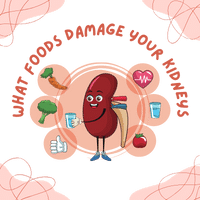What Foods Damage Your Kidneys?
The kidneys are vital organs responsible for filtering waste products, balancing electrolytes, and managing fluid levels in the body. Maintaining kidney health is crucial, and diet plays a significant role in this. Certain foods can be detrimental to kidney function, especially for those already at risk of kidney disease. Here’s a look at the foods that can harm your kidneys and why it’s important to be mindful of your dietary choices.
- High-Sodium Foods
Excessive salt intake can lead to high blood pressure, a major risk factor for kidney disease. Processed foods, canned soups, snack foods, and fast foods often contain high levels of sodium. Reducing salt in your diet can help lower blood pressure and decrease the strain on your kidneys.
- High-Phosphorus Foods
Phosphorus is an essential mineral, but too much of it can harm your kidneys. Dairy products, processed meats, and cola drinks are high in phosphorus. When kidneys are not functioning well, they can’t remove excess phosphorus, which can lead to weakened bones and other health issues.
- Processed Meats
Processed meats, such as bacon, sausage, and deli meats, contain high levels of sodium and preservatives, which can be harmful to your kidneys. These foods can increase the risk of developing kidney stones and other kidney-related problems.
- Red Meat
While protein is essential, too much red meat can put a strain on your kidneys. Red meat is high in protein and saturated fats, which can lead to kidney damage over time. It’s advisable to consume red meat in moderation and opt for leaner protein sources like fish, poultry, and plant-based proteins.
- Sugary Foods and Drinks
High sugar intake can lead to obesity, diabetes, and high blood pressure, all of which are risk factors for kidney disease. Sodas, candies, and baked goods with high sugar content should be consumed sparingly. Opt for natural sugars found in fruits and vegetables instead.
- Artificial Sweeteners
Some studies suggest that artificial sweeteners might negatively affect kidney function. While more research is needed, it’s wise to limit the intake of artificial sweeteners and opt for natural sweeteners like honey or stevia.
- Caffeine
Excessive caffeine intake from coffee, tea, and energy drinks can increase blood pressure and lead to kidney damage over time. Moderation is key when it comes to caffeine consumption.
- Alcohol
Heavy alcohol consumption can cause significant damage to your kidneys. Alcohol is a toxin that your kidneys have to filter out of your blood. Over time, excessive drinking can lead to kidney disease and other serious health problems.
- Oxalate-Rich Foods
Certain foods like spinach, beets, and nuts are high in oxalates, which can contribute to kidney stone formation. People prone to kidney stones should limit their intake of these foods.
- Dairy Products
While dairy is a good source of calcium, too much can be harmful to those with kidney issues. Excess calcium can lead to kidney stones and other kidney problems. Moderation and choosing low-fat options can help mitigate risks.
Tips for Kidney-Friendly Eating
To protect your kidneys, consider the following dietary tips:
- Stay Hydrated: Drink plenty of water to help your kidneys filter waste.
- Eat Fresh: Focus on fresh fruits, vegetables, and whole grains.
- Limit Protein: Choose lean protein sources and keep portions in check.
- Avoid Processed Foods: Opt for whole, unprocessed foods to reduce sodium and preservative intake.
- Monitor Blood Pressure and Blood Sugar: Regularly check these levels and manage them through diet and lifestyle changes.
Conclusion
Being mindful of your diet is essential for maintaining kidney health. By avoiding foods high in sodium, phosphorus, sugar, and unhealthy fats, you can reduce the risk of kidney damage and promote overall well-being. Remember to consult with a healthcare professional before making significant changes to your diet, especially if you have preexisting health conditions.
